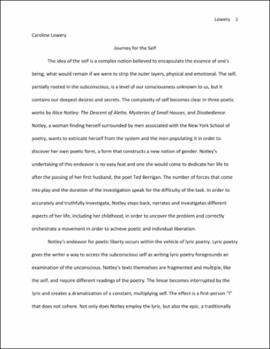| dc.description.abstract | Lyric poetry creates a voice foreign to the conscious voice of the writer. It filters the unconscious material within us and gives the writer access to that part of themselves through the act of writing. Lyric voice comes from an excess of "emotion recollected in tranquility," meaning it is an overflow of emotion that spills into the poem. Alice Notley deals with lyric voice in a number of her writings, as well as mixing lyric poetry with epic and autobiographical writing. Within the context of three works of Notley's, The Descent of Alette, Disobedience, and Mysteries of Small Houses, I seek to explore her use of lyric poetry as a vehicle for the exploration of the self. The Descent of Alette is a feminist epic that follows Alette through the journey of her subconscious to defeat the Tyrant, a menacing patriarchal figure, in order to reclaim herself. Alette's journey, while particular to her own story, will reveal a broader truth relevant to everyone. Mysteries of Small Houses is Notley's own journey for self-realization as she maps her own life story. Notley's reflections revolve around the idea that she is told, on multiple occasions, that she will not make a good poet, that she shouldn't write, and that she is often the victim of oppression of stigmatized gender roles. Notley makes many references to Alette throughout Mysteries of Small Houses as well as identifying with Alette — she wants to be her and achieve the level of reclamation of self that Alette achieves. Disobedience is characterized by the implications of its title. Her writing style is very off-the-wall and is difficult to read. She encounters a male figure, Hardwood, who has an odd resemblance to the Tyrant and is the figure she must overcome. In Disobedience, Notley takes her rebellion against the status quo to the next level. Written while she lives in France, she looks back at the United States in contempt and forces her readers to confront issues we prefer to look away from. Notley's mission in writing this trilogy is to find a new form of writing, free from the constraints of the male tradition. Her goal is to go back to a time before gender restraints existed and the notion of equality was a reality. In doing so, Notley would achieve the unification of her self — her conscious, female self with that of her unconscious, male self. This separation of self is maintained at the hands of those in power, the patriarchy. Notley's journey, however, brings her to the realization that the notion of the self is so complex, that it is singular and multiple at the same time, making her journey for discovery of the self a collective one. Her disobedience affords her the isolation she needed to come to this revelation and she encourages the same of her readership. The journey for the self, while personal, it is beneficial for everyone and a call to action to overthrow those power structures in place that impede us from reaching our full potential. | |
